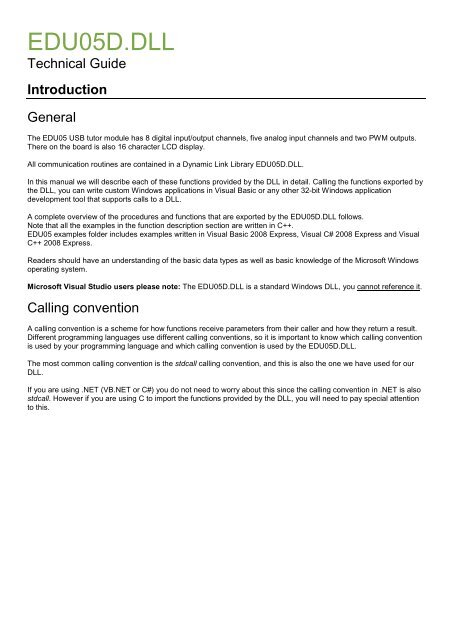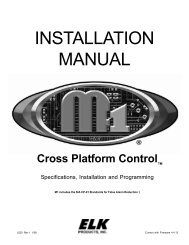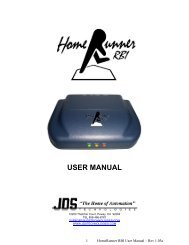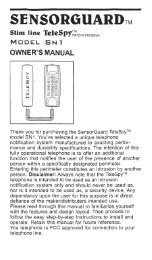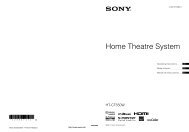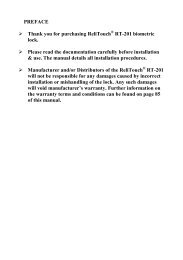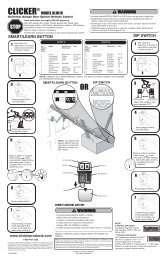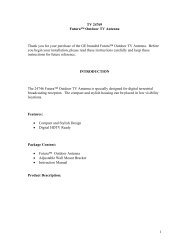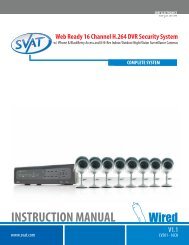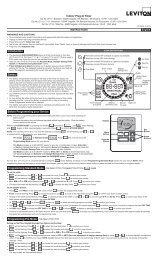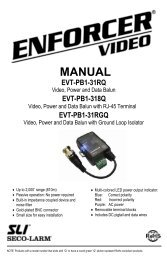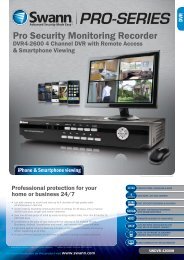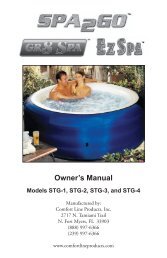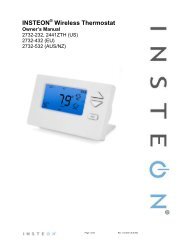You also want an ePaper? Increase the reach of your titles
YUMPU automatically turns print PDFs into web optimized ePapers that Google loves.
<strong>EDU05D</strong>.<strong>DLL</strong><br />
Technical Guide<br />
Introduction<br />
General<br />
The EDU05 USB tutor module has 8 digital input/output channels, five analog input channels and two PWM outputs.<br />
There on the board is also 16 character LCD display.<br />
All communication routines are contained in a Dynamic Link Library <strong>EDU05D</strong>.<strong>DLL</strong>.<br />
In this manual we will describe each of these functions provided by the <strong>DLL</strong> in detail. Calling the functions exported by<br />
the <strong>DLL</strong>, you can write custom Windows applications in Visual Basic or any other 32-bit Windows application<br />
development tool that supports calls to a <strong>DLL</strong>.<br />
A complete overview of the procedures and functions that are exported by the <strong>EDU05D</strong>.<strong>DLL</strong> follows.<br />
Note that all the examples in the function description section are written in C++.<br />
EDU05 examples folder includes examples written in Visual Basic 2008 Express, Visual C# 2008 Express and Visual<br />
C++ 2008 Express.<br />
Readers should have an understanding of the basic data types as well as basic knowledge of the Microsoft Windows<br />
operating system.<br />
Microsoft Visual Studio users please note: The <strong>EDU05D</strong>.<strong>DLL</strong> is a standard Windows <strong>DLL</strong>, you cannot reference it.<br />
Calling convention<br />
A calling convention is a scheme for how functions receive parameters from their caller and how they return a result.<br />
Different programming languages use different calling conventions, so it is important to know which calling convention<br />
is used by your programming language and which calling convention is used by the <strong>EDU05D</strong>.<strong>DLL</strong>.<br />
The most common calling convention is the stdcall calling convention, and this is also the one we have used for our<br />
<strong>DLL</strong>.<br />
If you are using .NET (VB.NET or C#) you do not need to worry about this since the calling convention in .NET is also<br />
stdcall. However if you are using C to import the functions provided by the <strong>DLL</strong>, you will need to pay special attention<br />
to this.
Overview of the Functions<br />
General functions<br />
int OpenDevice()<br />
void CloseDevice()<br />
int Connected()<br />
void InOutMode(int IOMode)<br />
Opens the communication link to the EDU05 device<br />
Closes the link to the EDU05 device<br />
Checks that the USB connection to the card is valid<br />
Set the digital terminals either inputs or outputs<br />
Analog to Digital converter function<br />
int ReadAnalogChannel(int Channel) Reads the status of one analog input-channel<br />
PWM Output function<br />
void SetPWM(int Channel, int Data) Sets the status the PWM output<br />
Digital Output functions<br />
void OutputAllDigital(int Data)<br />
Sets the digital outputs according to the data<br />
void ClearDigitalChannel(int Channel) Clears the output channel<br />
void ClearAllDigital()<br />
Clears all output channels<br />
void SetDigitalChannel(int Channel) Sets the output channel<br />
void SetAllDigital()<br />
Sets all output channels<br />
Digital Input functions<br />
int ReadAllDigital()<br />
Reads the status of all the input channels<br />
LCD functions<br />
void LCDInit()<br />
Initializes the LCD display module<br />
void LCDClear()<br />
Clears the text on the LCD display<br />
void void LCDWriteString(String^ Data, int Position);<br />
Writes text on the LCD display
Function List<br />
OpenDevice<br />
Syntax<br />
int OpenDevice();<br />
Result<br />
int: If succeeded the return value 1 indicates that EDU05 card was found.<br />
Return value 0 indicates that no EDU05 card found.<br />
Description<br />
Opens the communication link to the EDU05 card. Loads the drivers needed to communicate via the USB port. This<br />
procedure must be performed before any attempts to communicate with the EDU05 card.<br />
Example<br />
int h = OpenDevice();<br />
switch (h)<br />
{<br />
case 0:<br />
Label1->Text = "EDU05 not found";<br />
break;<br />
case 1:<br />
Label1->Text = "EDU05 connected";<br />
IOMode = 1;<br />
InOutMode(IOMode);<br />
RadioButton3->Checked = true;<br />
Timer1->Enabled = true;<br />
break;<br />
}<br />
CloseDevice<br />
Syntax<br />
void CloseDevice();<br />
Description<br />
Unloads the communication routines for EDU05 card and unloads the driver needed to communicate via the USB port.<br />
This is the last action of the application program before termination.<br />
Example<br />
private: System::Void Form1_FormClosed(System::Object^ sender,<br />
System::Windows::Forms::FormClosedEventArgs^ e)<br />
{<br />
CloseDevice();<br />
}<br />
ReadAnalogChannel<br />
Syntax<br />
int ReadAnalogChannel(int Channel);<br />
Parameter<br />
Channel: Value between 1 and 5 which corresponds to the AD channel whose status is to be read.<br />
Result<br />
int: The corresponding Analog to Digital Converter data is read.<br />
Description<br />
The input voltage of the selected 10-bit Analog to Digital converter channel is converted to a value which lies between<br />
0 and 1023.
Example<br />
int Buffer[5];<br />
int i;<br />
for (i=0; i
InOutMode(0);<br />
ClearAllDigital(CardAddress);<br />
SetDigitalChannel<br />
Syntax<br />
void SetDigitalChannel(int Channel);<br />
Parameter<br />
Channel: Value between 1 and 8 which corresponds to the output channel that is to be set.<br />
Description<br />
The selected digital output channel is set.<br />
Example<br />
if (CheckBox3->Checked)<br />
SetDigitalChannel(3);<br />
else<br />
ClearDigitalChannel(3);<br />
SetAllDigital<br />
Syntax<br />
void SetAllDigital();<br />
Description<br />
All the digital output channels are set.<br />
Example<br />
InOutMode(0);<br />
SetAllDigital(CardAddress);<br />
SetPWM<br />
Syntax<br />
void SetPWM(int Channel, int Data);<br />
Parameters<br />
Channel: The PWM output channel 1 or 2.<br />
Data: Value between 0 and 255 which is to be sent to the PWM output of the card. The duty cycle of the PWM output<br />
corresponds to the data value: 0 = 0%, 255 = 100% duty cycle.<br />
Example<br />
SetPWM(1, 128); // The duty cycle of the PWM output #1 is set to 50%<br />
Connected<br />
Syntax<br />
bool Connected();<br />
Result<br />
bool: true if the card is connected, false if not connected.<br />
Description<br />
Checks that USB connection to the cards is valid.<br />
Example<br />
if (Connected())<br />
Label1->Text = "EDU05 connected";<br />
else
Label1->Text = "EDU05 not connected";<br />
LCDInit<br />
Syntax<br />
void LCDInit();<br />
Description<br />
Initializes the LCD display module.<br />
Example<br />
InOutMode(0);<br />
LCDInit();<br />
LCDClear<br />
Syntax<br />
void LCDClear();<br />
Description<br />
Clears the LCD display.<br />
Example<br />
InOutMode(0);<br />
LCDClear();<br />
LCDWriteString<br />
Syntax<br />
void LCDWriteString(String^ Data, int Position);<br />
Parameters<br />
Data: Pointer to the text string.<br />
Position: Text position (0...15) on the LCD display.<br />
Example<br />
InOutMode(0);<br />
LCDWriteString(textBox1->Text,Convert::ToInt32(textBox2->Text));
Function declarations in other programming languages<br />
Visual Basic 2008 Express<br />
Private Declare Function OpenDevice Lib "edu05d.dll" () As Integer<br />
Private Declare Sub CloseDevice Lib "edu05d.dll" ()<br />
Private Declare Function Connected Lib "edu05d.dll" () As Boolean<br />
Private Declare Function ReadAnalogChannel Lib "edu05d.dll" (ByVal Channel As Integer) As Integer<br />
Private Declare Function ReadAllDigital Lib "edu05d.dll" () As Integer<br />
Private Declare Sub SetPWM Lib "edu05d.dll" (ByVal Channel As Integer, ByVal Data As Integer)<br />
Private Declare Sub InOutMode Lib "edu05d.dll" (ByVal IOMode As Integer)<br />
Private Declare Sub OutputAllDigital Lib "edu05d.dll" (ByVal Data As Integer)<br />
Private Declare Sub ClearAllDigital Lib "edu05d.dll" ()<br />
Private Declare Sub SetAllDigital Lib "edu05d.dll" ()<br />
Private Declare Sub ClearDigitalChannel Lib "edu05d.dll" (ByVal Channel As Integer)<br />
Private Declare Sub SetDigitalChannel Lib "edu05d.dll" (ByVal Channel As Integer)<br />
Private Declare Sub LCDInit Lib "edu05d.dll" ()<br />
Private Declare Sub LCDClear Lib "edu05d.dll" ()<br />
Private Declare Sub LCDWriteString Lib "edu05d.dll" (ByVal Data As String, ByVal Position As Integer)<br />
Visual C# 2008 Express<br />
[DllImport("edu05d.dll")]<br />
public static extern int OpenDevice();<br />
[DllImport("edu05d.dll")]<br />
public static extern void CloseDevice();<br />
[DllImport("edu05d.dll")]<br />
public static extern bool Connected();<br />
[DllImport("edu05d.dll")]<br />
public static extern int ReadAnalogChannel(int Channel);<br />
[DllImport("edu05d.dll")]<br />
public static extern int ReadAllDigital();<br />
[DllImport("edu05d.dll")]<br />
public static extern void SetPWM(int Channel, int Data);<br />
[DllImport("edu05d.dll")]<br />
public static extern void InOutMode(int IOMode);<br />
[DllImport("edu05d.dll")]<br />
public static extern void OutputAllDigital(int Data);<br />
[DllImport("edu05d.dll")]<br />
public static extern void ClearAllDigital();<br />
[DllImport("edu05d.dll")]<br />
public static extern void SetAllDigital();<br />
[DllImport("edu05d.dll")]<br />
public static extern void ClearDigitalChannel(int Channel);<br />
[DllImport("edu05d.dll")]<br />
public static extern void SetDigitalChannel(int Channel);<br />
[DllImport("edu05d.dll")]<br />
public static extern void LCDInit();<br />
[DllImport("edu05d.dll")]<br />
public static extern void LCDClear();<br />
[DllImport("edu05d.dll")]<br />
public static extern void LCDWriteString(string Data, int Position);


